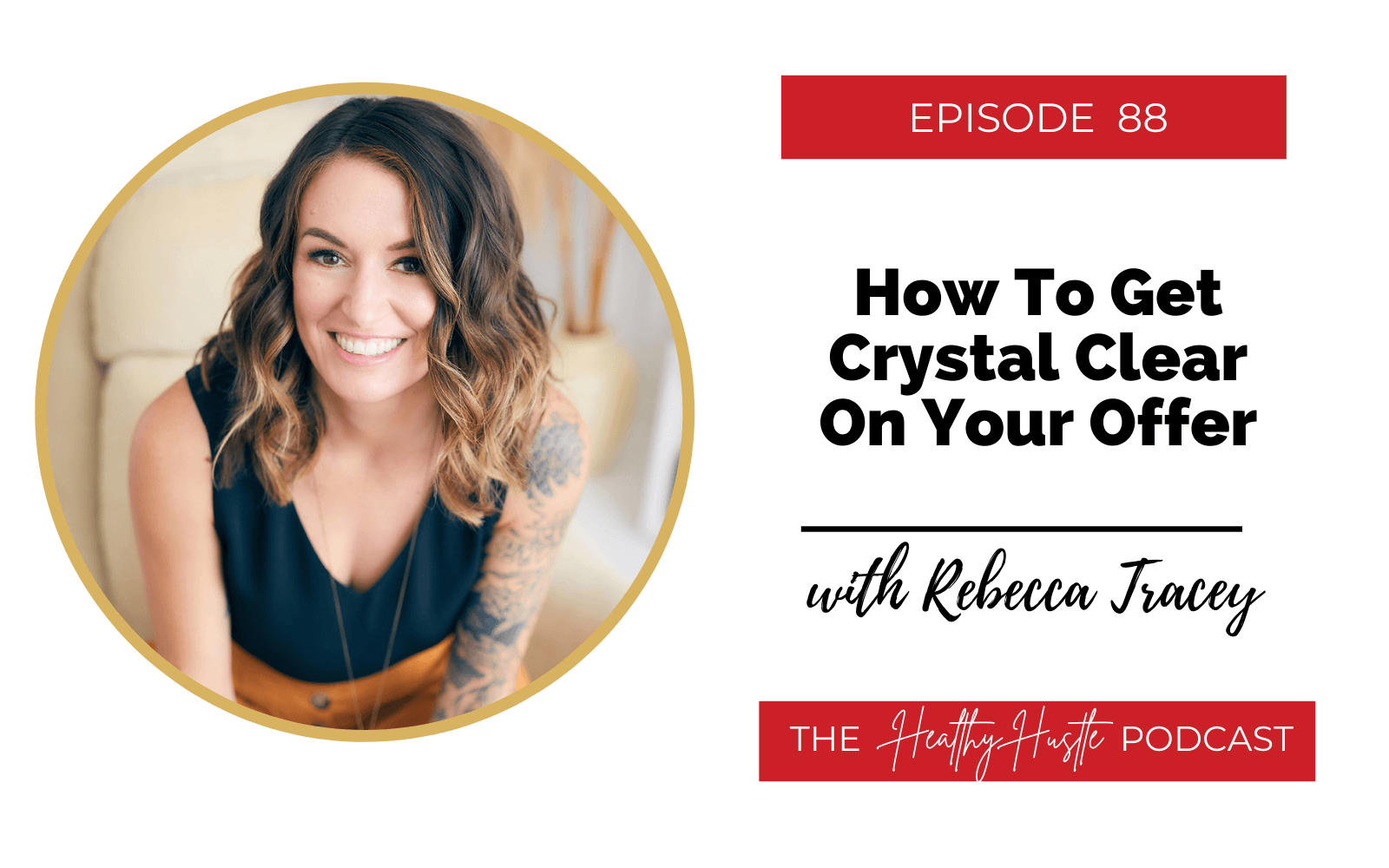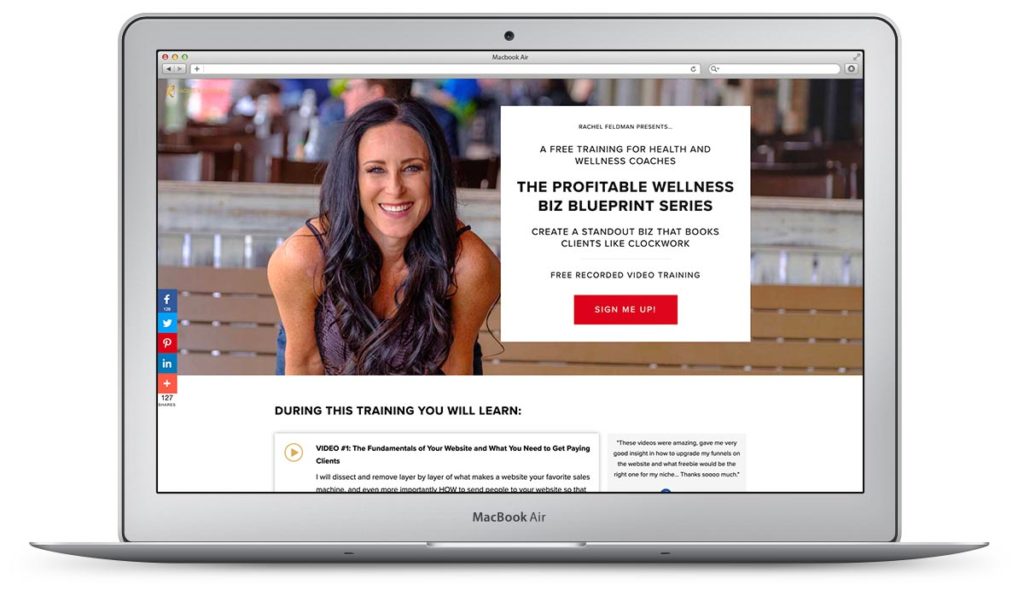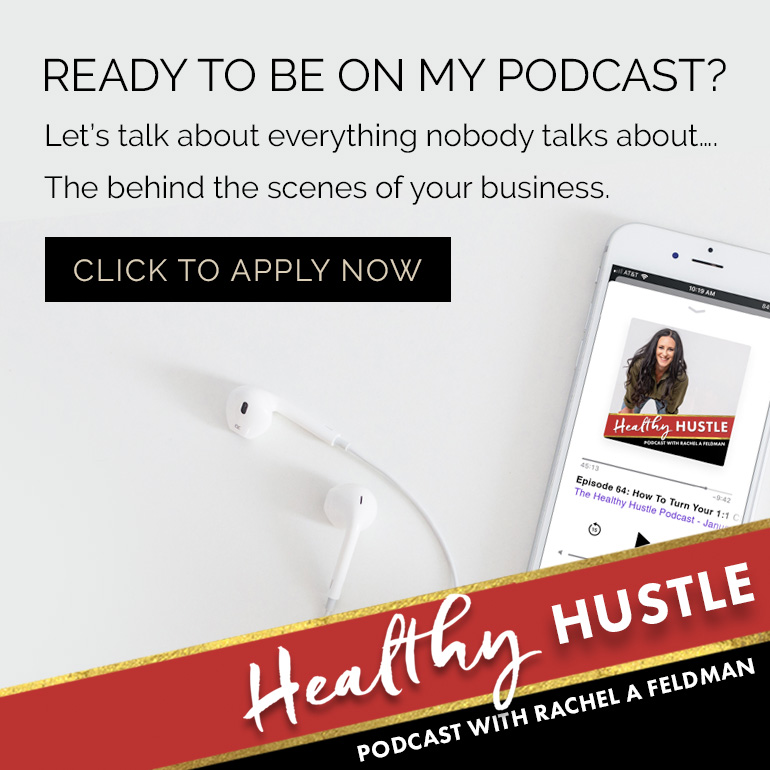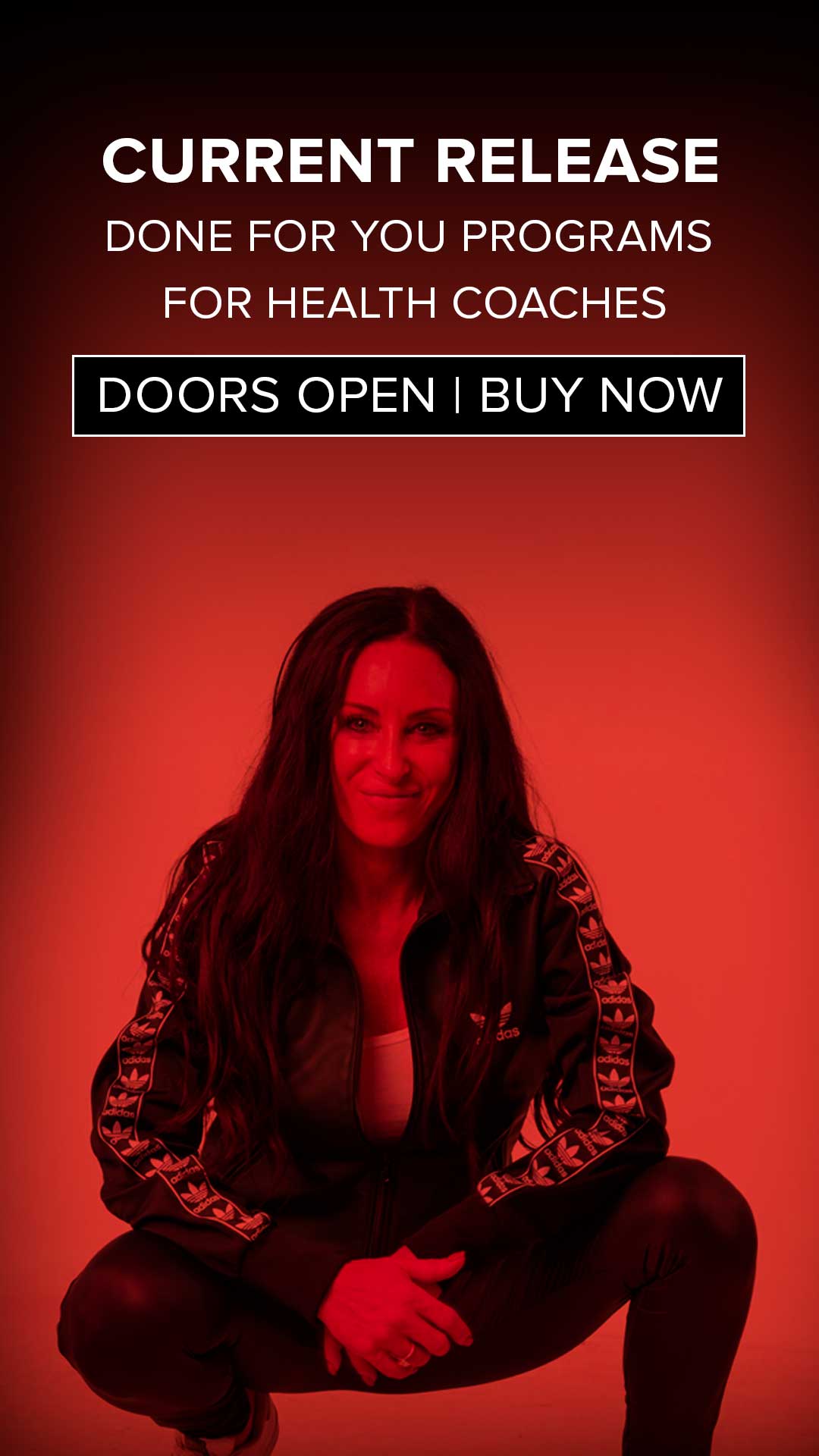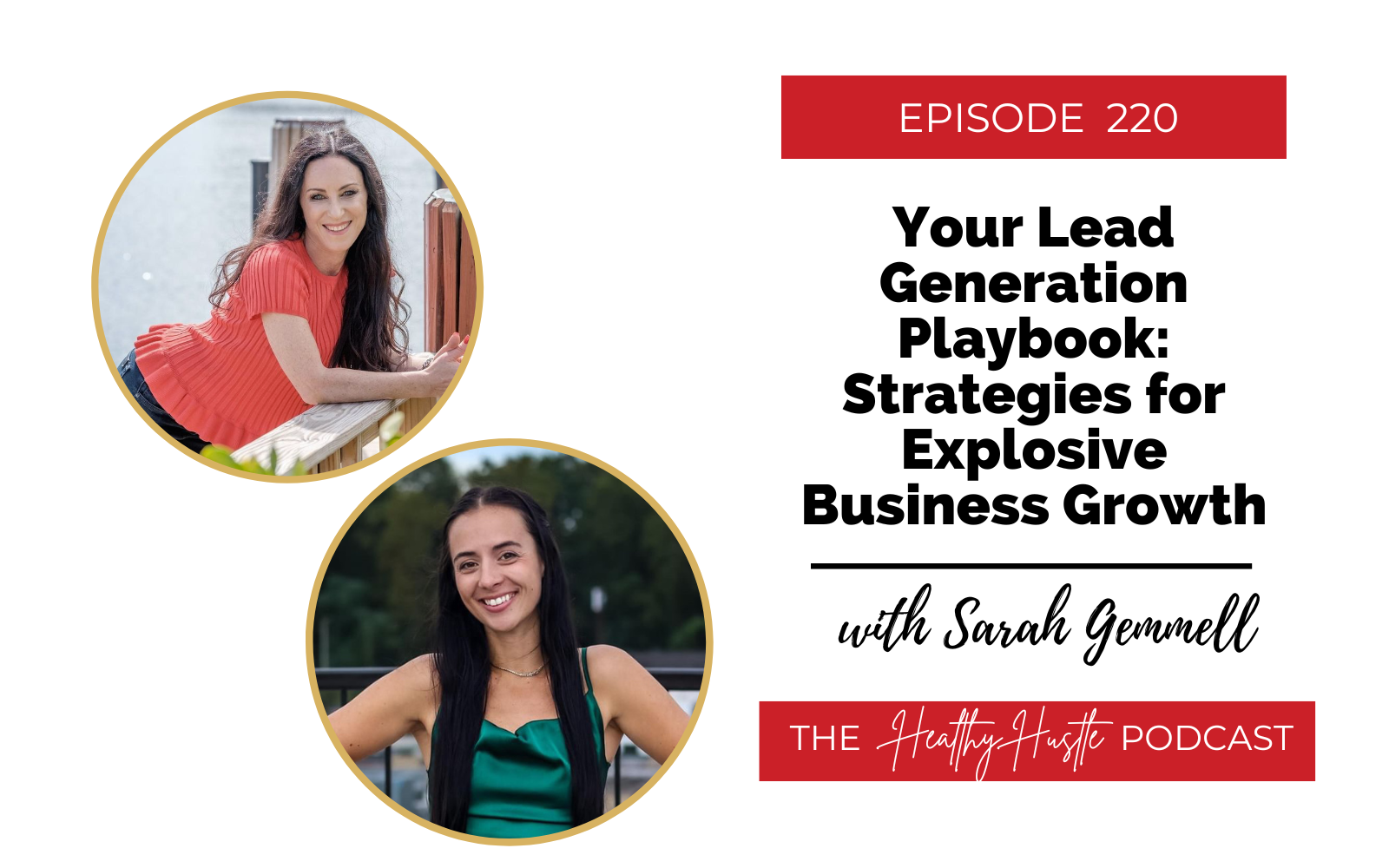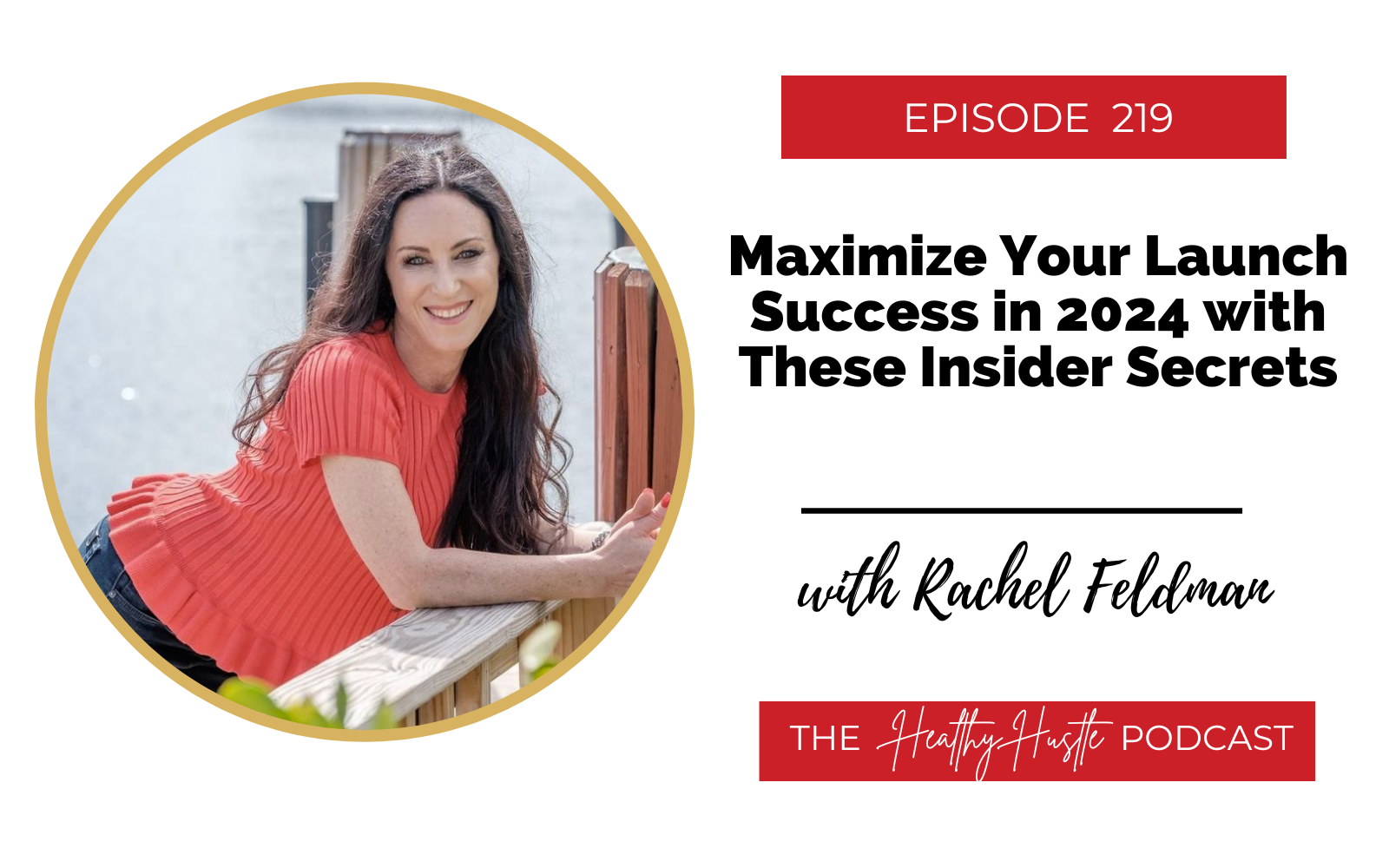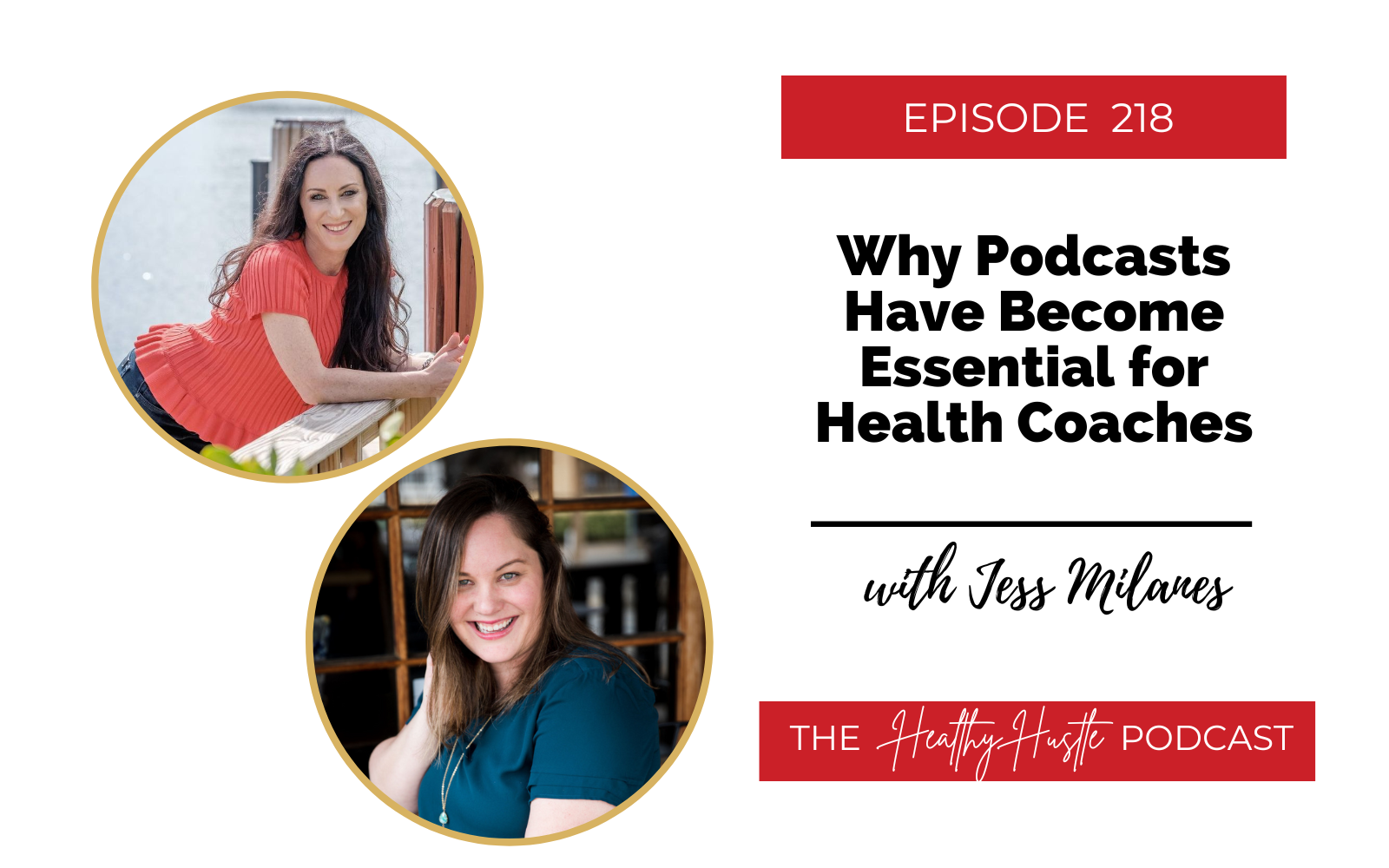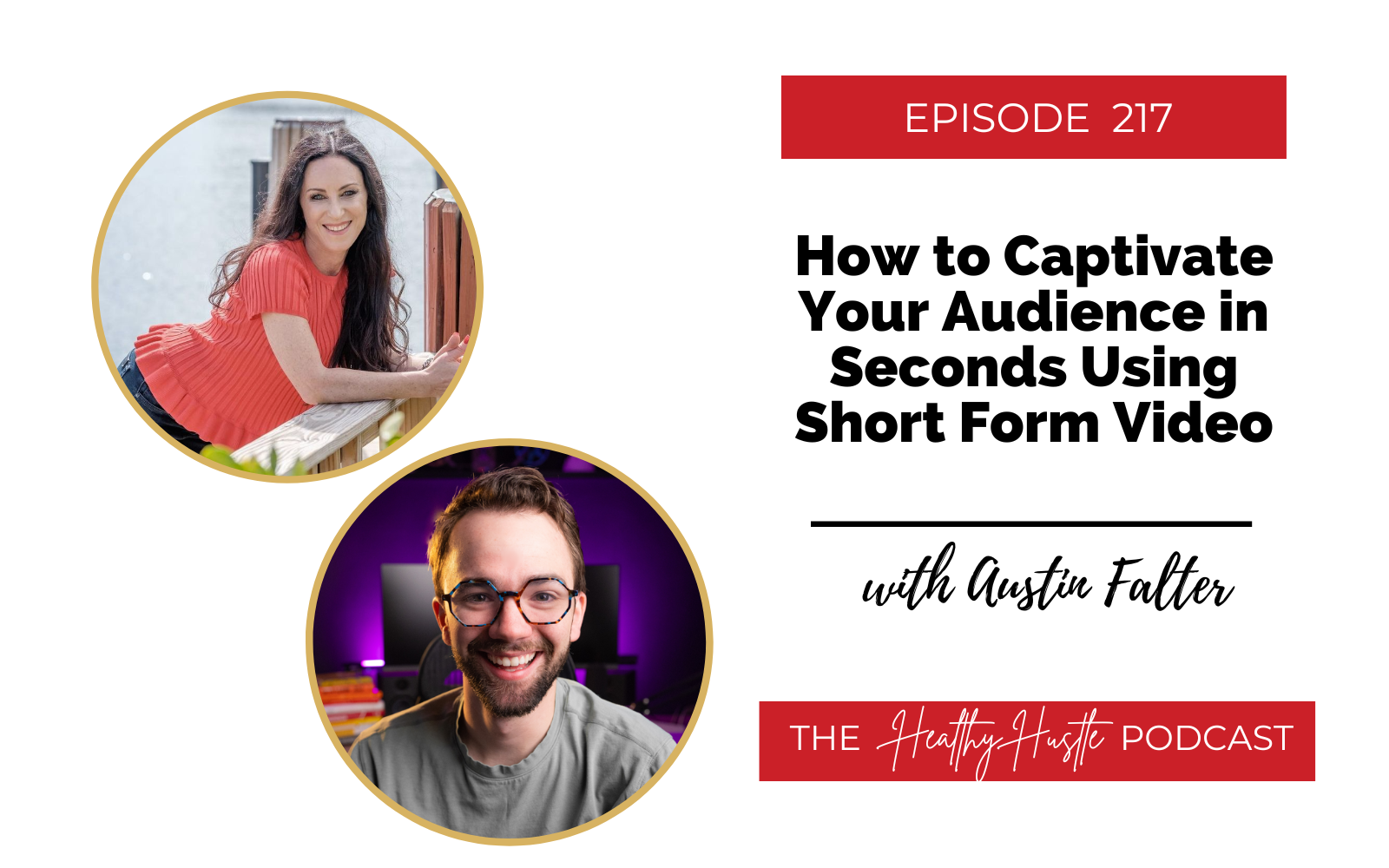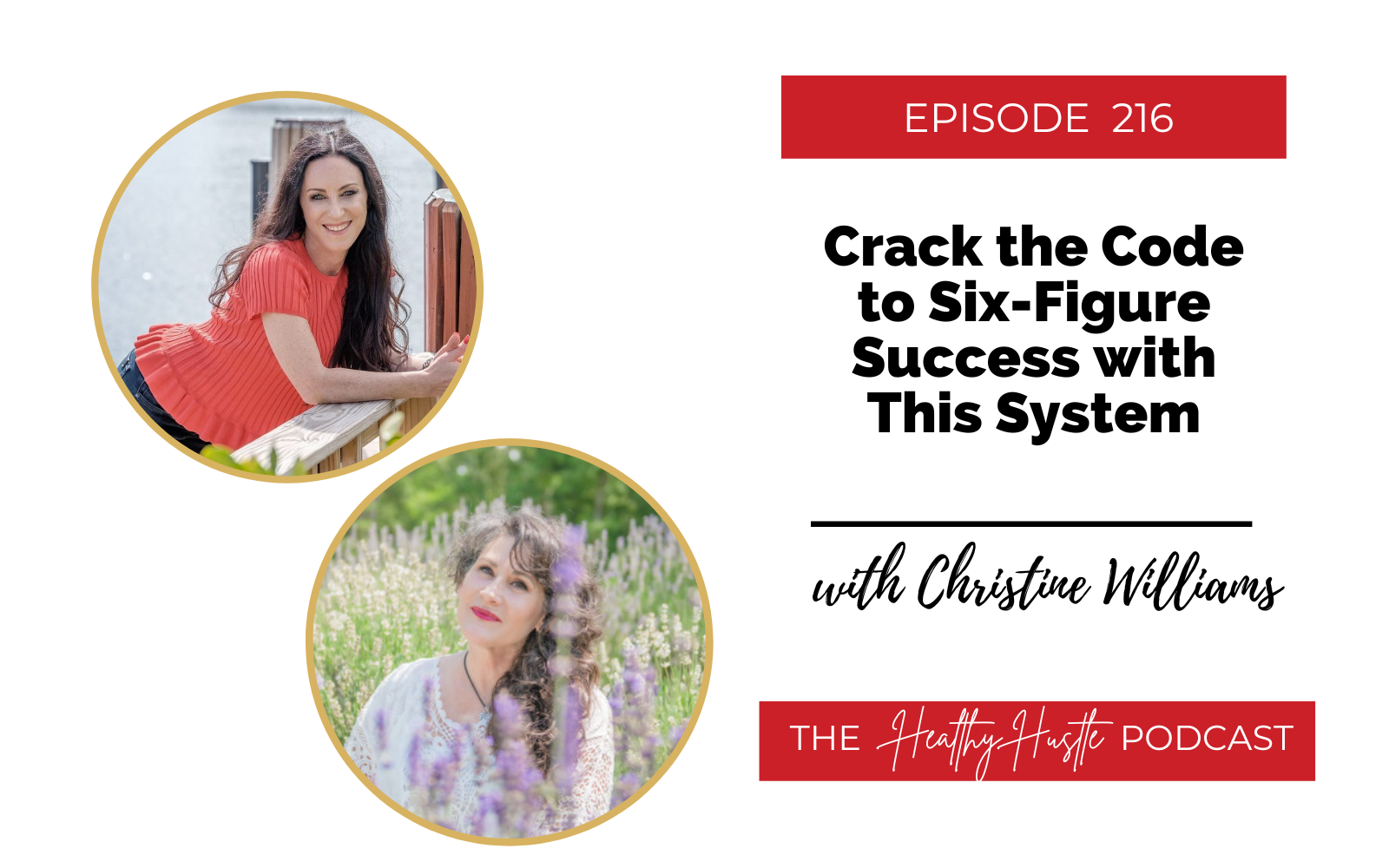Niching down and finding clarity in how you serve your clients is one of the first steps to take as a new business owner. Surprisingly, a lot of coaches and business owners struggle with this part. But when you have clarity around what you do, you can position yourself as the answer to your audiences’ problems and actually sell out your offers.
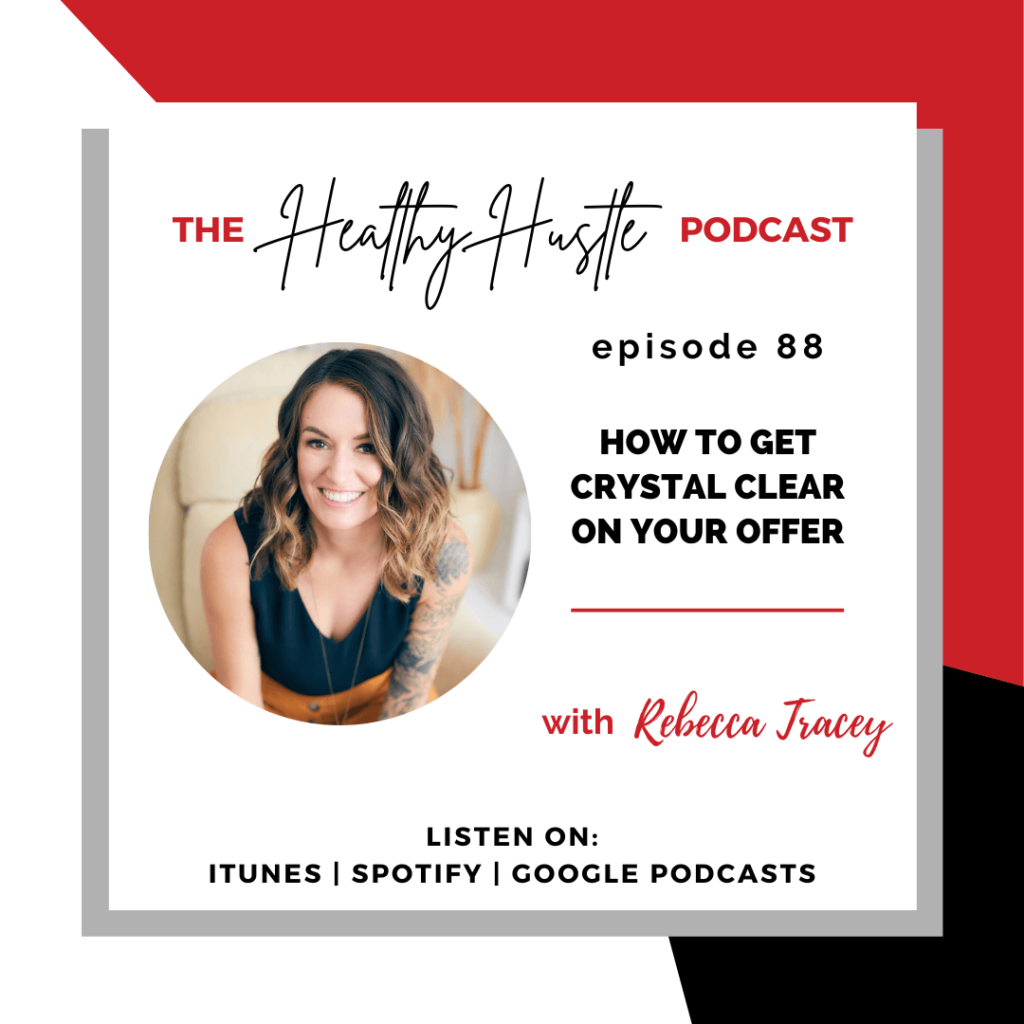
In today’s episode, I am talking to Rebecca Tracey, a coach who helps service-based solopreneurs get clients by clarifying their offers before marketing them. Rebecca is the master of discovering your clarity and she’s sharing all her incredible insight with us today. She’s talking all about the importance of niching, why you need to find clarity in your messaging, and how to create content that encourages conversion rather than consumption.
Connect with Rebecca:
Website: https://theuncagedlife.com/
Instagram: www.instagram.com/theuncagedlife
Facebook Group: https://www.facebook.com/groups/UncagedLifers/
Resources:
Visit https://yourhealthcoachbiz.com/links/ for a few freebies and to read through my mini-courses. Make sure to go to my Facebook page HERE to get notified when I’m going Live. Don’t forget to tag me on Instagram at @RachelAFeldman and let me know what your favorite part of the episode was.
Are you a health-coach in need of some done-for-you content? Check HERE to shop by niche and find exactly what you need. Ready to create a 6-figure business of your own? I can help you get started: https://yourhealthcoachbiz.com/vip-replay/
Rachel: Alright guys, I can’t believe it. I’m with this woman again. She and I were just talking about how six years ago, I got to interview her. And I wanted her for that interview because she gets down and dirty when it comes to building your wellness business and not making the mistakes that everyone makes. So, girl gives a brief this is what I do. Because you are the messaging lady.
Rebecca: Hello, I’m Rebecca Tracy, I work with coaches and service-based businesses and solopreneurs to help them learn how to get clients. I focus a lot on the clarity piece that comes before the marketing piece. Because as we know, and people listening to this might know, we’d like to jump into marketing because it’s a resource to market, right. And there’s a whole thing that you have to do before you market to actually make your marketing work. So I focus on those steps.
Being Clear About What You Do & How You Help
Rachel: Before we talk about the behind the scenes of the struggle at the beginning of building that wellness biz, what would you say is the biggest misconception that you see in this industry, that’s really not having that forward momentum for that wellness coach?
Rebecca: There’s so many things. The biggest thing that stops new coaches from getting clients right away is that most of them can’t clearly even explain what they do. So I asked for a show of hands, but we’re on a podcast. Right? Even talking about a clear elevator pitch. Because even that sometimes can still be kind of vague and jargony. So it’s really clearly being able to articulate to somebody who’s in front of you, what you do, and how you can help them.
So what coaches tend to do, and I work with a lot of life coaches and health coaches, so to give examples from both, but, big picture: I help you live an authentic life and feel vibrant every day and really live your best life.
Rachel: There’s a lot of language and even in the health coaching world, which we always call meme-worthy. If you post that on Instagram, people are gonna go like it and they’re gonna go, you’re so inspiring, but they’re not gonna pay you for it. No one’s paying for that.
Rebecca: So this is where I see a lot of new coaches spend a ton of time. On Instagram,on their website and trying to create this inspirational content. People seem interested. People love it. I’m getting so many likes, but no one’s buying anything. And it’s so clear why it’s because they’re not actually telling people what they can do for them.
When I look back to those motivational posts, and the ones that are like, you’ve got this girl, you can do like, rise with the tide. It does inspire everyone. It’s what we look for, especially in any time in life when we’re feeling like we want to transition from this is really wearing me down whether it’s my god or it’s or it’s my mindset, or I’m over eating or all these different things that we do when life is out of balance. But it doesn’t help our ideal client to say, Wow, I’m gonna actually stop, opt in to either freebie or join this person’s group because it’s so vague, and it doesn’t even know how this coach can actually help them. Or maybe they’ll join the group, but they’ll never pay them for anything.
How Coaches Can Differentiate Themselves By Niching
Rachel: What do you suggest as a step one. You want to know who you want to serve, what age they are, what’s their life like, how is it affecting them to not make forward momentum? I want you to really give that coach a nitty gritty on how I do it differently. This is where you’re being misled.
Rebecca: Yeah. Because with niching, I think it’s easy to get trapped into picking an age group. And so what I see a lot is health coaches saying I work with women 25 to 45, to help them feel their best. And they think they’ve dialed entities because they’ve got women, they’ve got an age range, and they’ve got a thing that they do. But none of those things are specific enough. So I don’t necessarily subscribe to the age range. I don’t think it matters unless you’re specifically working with teen girls or retired people. Unless there’s a reason for it to be there.
But women aged 25 to 45. It’s irrelevant. What matters more is being able to clearly articulate what you’re actually doing for those people. So what’s the problem that those people are waking up every day with, that they’re googling? What they’re pitching to their friends about that they can’t solve that you are going to solve for them. Because once you’ve got that clear.
People freak out about niching, I’m sure you see this too, where it’s like, I don’t want to narrow myself in, I don’t want to exclude people. But when you niche around a problem, it actually lets you work with all different kinds of people. So you can work with someone who’s 25 or 45, or retired or younger, doesn’t really matter, because they’re still struggling with the same problem. I think it gives you a lot of expansion when you niche because it actually helps you get paid.
For people who are struggling. Once you start to get paid, all of your fears are going to go away, because you’re going to be getting to actually do the work that you want to be doing, you’re gonna be getting paid for it, the stress is going to dissipate. It’s when we’re in this phase of trying all the things and not niching and also not making money that everything feels huge and scary. But niching can, I think, really bring so much freedom.
Rachel: That’s the part that I always say to coaches. Stop focusing on your elevator pitch, stop trying to make it look so fabulous, even for a bio. Spend more time thinking, if I’m working with women, what are the problems that they’re facing? Is it the same problem for somebody who’s working in a CEO position to a woman nine to five to a mom. And dismay, or time at least this is what worked for me, really focusing down on being so specific in that one social media post? Or that one talk?
How To Line Up What You Do With What Someone Is Struggling With
Rebecca: Yeah. Really stepping into the shoes of that person and thinking, why does this person need me? I know why they need me.
Rachel: So do they know?
Rebecca: Yeah, I think that’s the crux of it is like, we often know. We’re the coaches, we have all this insider knowledge about people’s health and wellness and what they really need. But what is that person looking for help with? Because often there’s a mismatch between what we’re selling and what that person actually thinks they need. And so we have to change our marketing. And we have to change how we talk about what we do to line up with what that person is struggling with, even though we can see five steps down the line for them. And we’re like, what you really need is self love, right?
So we know that we’re the coaches, but they’re not sitting there going, how do I love myself? They’re googling real everyday problems that they’re having due to us, we’ll use this example not loving themselves. So we can’t market self love, we have to market the things that they’re googling. And then once we get them in our world, we do all our people use our tools and do all that coaching with them. But we’ve got to get them in the door first and get them actually interested in working with us.
Why You Need Clarity Before Marketing
Rachel: So for this coach that is sitting there saying, Yeah, Becca, I hear this all the time. But how do I do this? How do I write down my problems? Do I then go and make story titles?
Rebecca: Yeah, first of all, I think that trying to do other marketing to try and be on social media, write blog posts, all of that stuff when you’re starting, I personally think is a bit of a waste of time until you have this clarity. Because once you have clarity, it’s like you said, Rachel, everything you do, you can make your Instagram posts so specific, you can make your blog post so specific. And so if you’re putting all that time into doing that, creating that content –you want to make sure that it’s actually going to work.
So my first thing is pause on all of that, pause on everything. You don’t need to be posting on social right now. Take a step back. And this is where many people don’t want to do it. But I already thought I had an issue, right? But if it’s not working, then you have to do this and go and do market research. So really what that means is just going and finding five people who you think would be your ideal folks and talking to them, asking them questions, digging in, getting curious about things like, what’s going on for them?
Let’s say that you are someone who coaches around self love asking them, do you identify with the term self love? Is that something that you feel like you have or don’t have? Because they might be? No, I’ve never thought of it that way. Great. So you’re not going to be marketing that then. But that’s how you really get those answers. So instead of guessing, people are literally telling you what language to use, what to say, what their struggles are. And then you can go and use that language in all of your posts.
Instead of missing the mark, you’re gonna be hitting the nail on the head, and people are gonna be like, Oh, my God, it’s like you’re reading my mind. And that’s the difference between just liking your Instagram post and actually DMing you and going, Oh, my God, I think I need you, right?
Rachel: I was just, I was trying to explain exactly what you said so beautifully to somebody. I said, No. All of our programs, our freebies, and our blog posts, they all have to solve a problem. They have to be specific. But I said, but if you don’t know who you serve and why, what are they actually intentionally searching for? If you’re not getting people from day one, the day you leave school, and you are used to doing health histories with people and hearing and practicing coaching, it’s going to be very hard to say.
How To Position Yourself As The Answer To Their Problems
So this one blog post is on breathing. But how can I position this one blog post for my client who is struggling with these top five problems? And then does the client even know that they have adrenal fatigue, or mindset issues, or trauma or PTSD? Yeah, all these things that influence that person to be in the hot mess zone.
Rebecca: Yeah, and that’s one thing that coaches do a lot is they try to sell their process. So I’m going to teach you breathing, I’m going to do life coaching on you, we’re going to look at your life journey, whatever all the little tools are, that you have, no matter what kind of coach you are, we have to try to sell the process. I love your example of breathing, because most people would probably be like, I don’t need breathing, but I am constipated all the time. That’s what I need help with. Right.
So you have tied all these links together in your head of how breathing can help them, but they don’t know that. And so we need to bridge the gap between what we know and what they know, and how our modalities are going to solve their problems. So we have to talk more about their problems than about our modalities.
How To Get In Front Of The Right People In The Right Way
Rachel:And would you say for that coach who’s saying, okay, but Becca, I’m in the throes of it. My social media is everywhere. And they don’t want to pause it. But what would you say, for that person who says I have, I feel like I’m kind of there. I’m getting engagement. People are DMing. me, but I’m attracting the wrong type of person.
Rebecca: Yeah, so then you’re not there. Engagement doesn’t mean anything. You can have accounts that have hundreds of followers and likes and they’re not making any money. Right. I just think it’s a waste of time to be on social media, when you’re starting. I don’t think it’s the best way to get clients. When you’re starting. Even once you’ve got this clarity. Sure, if you have oodles of time, you can be posting on social and creating the content and making stories. But if you have limited time, there are faster ways to get in front of the right people.
So if you think it’s working, but you’re not getting paid if you’re getting on consultation calls, or if you’re not even getting consoles. First of all, if you’re getting on consoles and people aren’t saying yes, then it’s not working. And it means that we need to get more clear about the benefits of what you offer and what that can bring to that person’s life.
Every wellness practitioner, or people that hire you come and ask oh, what did you do? I always say it’s, it’s not what you think. You think that I build on social media, but I built it by going into my community by getting in front of other people’s audiences, because I would say here, so I specialize in helping people poop, like my main thing is fungal issues and food allergies. But every one of those specific workshops that I did, were really specific in that area.
And even the yoga centers that they were like, let me never one hears into meditating and I said, Why have you met me right now? Because I’m the opposite of yin and meditate. What I can teach you is how our inability to slow down and some of our viral components feed into this.
Rachel: So would you say that the shorter and easier way is getting in front of different people and positioning yourself before you spend hours of time on social media?
Why Social Media Doesn’t Always Work
Rebecca: Yeah, social media is great for market research. It’s a great optimizer. So once you are doing something that’s already working, it’s great to get more traction and get some social proof behind you. We’re only just building up an Instagram and I have been in business for a decade, and are nearing a million dollars. And we’re like, maybe we should do some Instagram.
So it’s not the fastest way. Take your time before you go and spend. For most people, it’s a long game. And at the beginning, you need clients coming in, and you need to get paid, or else you’re going to burn out. Because if you are doing so much work and not getting paid, you’re going to be like, Oh, this is never gonna work, right, and you’re gonna quit. So you need money coming in quickly, so that you can see that this could be a viable thing. And then you’ll be motivated to keep going.
Instagram is not the way. Maybe market research posts, maybe popping into Facebook groups and using the search function to see what people are talking about in terms of your topic. But what you said, getting in front of other people’s audiences, just getting exposure in places where your people already exist is so much faster. So I don’t even want people to spend time writing a ton of blog posts when they start. I have clients that come in, they’re like I write two blog posts a week and a newsletter. And I’m like, who’s reading it? And they’re like, Well, I have 25 people. And I’m like, right.
How To Borrow Someone Else’s Audience
So going and writing a blog for someone else’s site or podcasts, like getting in front of somebody else’s audience through their podcast, is a fantastic way to do it. Podcasters, as always, need guests. Pitch, send something specific and interesting. And it doesn’t matter if you have a massive reach that you need content, Facebook groups going into somebody’s group or getting interviewed. There’s so many ways that you can borrow audiences and get in front of ones that already exist to get that exposure. But you need to be clear before you do that, because if you start doing that, and getting all this exposure, but you actually don’t have the clarity, then it’s sort of wasted time.
Rachel: I agree with you completely. You and I were talking about the power of repetition, when you’re not just teaching, but you’re really trying to instill something that’s a habit. Get specific on what you want to be known for, the problem that you solve and pitch it to podcast to group admins. Everyone is always looking for somebody to come in and solve a specific problem. But I always hear Oh, well, it’s not a perfect chat, or I’m not ready. Or I think it’s also that it’s scary to take that step because you’re really then going in.
And that’s why people love social media, because you get to do it behind the scenes and you feel like you’re busy. The same with tinkering with your website. Same with messing around with the logo. You don’t need a logo, anyone who’s been spending agonizing time over finding a logo. You don’t need a logo or a business name. So all those things make us feel like we’re doing work, right? Because we’re like, I’m working on my business. No you’re making all these Instagram meme and you’re obsessing over colors, and you feel like you’re growing your business, but it’s actually great procrastination strategies for people who are either not confident yet because they don’t have the clarity, which is often something people don’t realize. I’ve met because that’s the scary part. Like what step am I going to take them?
Why Having Clarity Matters
Rebecca: Yeah. And then people who are afraid of being visible, usually because the competence isn’t there. And what I love seeing with my students, and I’m sure you see this with the folks you work with, too, is once that clarity comes, it’s like, oh, yeah, I could talk about this all day. And they get so stoked about going and pitching themselves, because they’ve actually got something concrete.
When it’s kind of vague, it’s like, Oh, I just can’t get a health coach in school. Oh, well, what do you do? Well, I help people fuel their bodies and thrive. And it’s clarity and specificity, it will make you so much more confident to go and start putting yourself out there. So it has this huge ripple effect on every single thing that you do in your business.
Rachel: I’m a health coach. I don’t know if you do that. But I went to high school, you just nutrition schools. I’m a holistic nutritionist, technically. And same thing. I did it too, right. It’s so common, but this is why we’re here to help fast track you through that stage and hopefully not spend too much time.
I remember I would go PTA because of my kids and people would be like, oh, what do you do? And I would go into the song like, I’m a holistic health coach. I help people feel better with their garden. So it’s like it just was a run on sentence and then someone you’re like, oh God, do they like it? Right and then it was when I hired somebody because I was at that time where I was like, either figure this outrage, or this I was at that two year just raising frustration and hustling way more than I should have. And maybe that’s part of the process in the beginning, hopefully somebody listened, and is like, I’m not going to do that.
And I get specific, but I needed a coach to tell me, I don’t even know what you’re talking about. I know, I’m a coach. And if I were a person sitting, whether it’s a doctor’s office, or a party, and you’re telling me, I’m like her, she doesn’t even know what she’s doing. I’m not even gonna hire her or spend another minute talking to her. Would you say for the person who feels like they do know what they’re talking about? But they are not clear in their messaging? What would you say? And I’m sure you tell this to your students? What is that stuff? I know, it’s market research. But do you think that there’s a confidence part, or an imposter par?
Why People Are Consuming Instead Of Converting
Rebecca: I think that if you think that you’re clear, but you’re putting out content, you’re sort of doing things and you’re just not getting any consults. No one is coming to you being like, I think I need to work with you that you’re probably not clear. So it’s either you’re not clear enough, or you’re not getting in front of enough of the right people. Most of the time, it’s that you’re not clear enough.
You can always ask people too. I did this, probably two years into my business, I sent out an email to my list. I don’t know how many people were on it at the time. Can’t remember, probably not that many. But I said, Hey I’m reevaluating my business. And I would love for you to tell me in your own words, what you think I do. If you were to refer someone to me, what would you tell them I do? And I got emails back. And people had no idea. I thought it was clear. And they were like, Well, I know you’re all about living un caged and freedom. But to be honest, I don’t really know how you help people do that. And I was like, Well, shit. No wonder you’re not giving me any money, then. You’re consuming instead of converting.
Rachel: Yeah, when you came out of school, what was your original vision of helping?
How To Get Clear On Your Offering
Rebecca: Oh, my gosh. So I did a training in holistic nutrition. I did life coaching training. And I was always interested in business. I didn’t know anything about marketing. But I was interested in creating your own path and working for yourself. And so I was trying to smoosh all the things together. And I remember sitting there agonizing at coffee shops. Building my first website trying to figure out how I was supposed to fit recipes into this life coaching blog.
I was writing and I didn’t want to write recipes. I was not a cooking person. They thought I had to because I went to nutrition school and people want recipes. And so I remember just, I had like three categories. I had, eat, think and be and so that I was like, well, I’ll just have a category for each one of my blogs. So many people do this. If this is you please don’t do this. It doesn’t work, right? We’re like, well, I’ll talk about food over here. And then mindset piece over here. And then the action/adventure piece over here. I thought that was a good idea. It wasn’t right, because no one knows what you do. Are you an adventure coach? Are you a life coach? Are you helping me proof? Are you giving me recipes? What are you doing?
So I very quickly realized that I was struggling so much to fit it together that I was like, What if I just dropped the nutrition piece? What if I just got really honest with myself, that is the piece I don’t want to do. I went to school for two years for it. And then I decided I didn’t want to do it. And I just had to own that. And so I was like, What if you just let that go and focus on this coaching piece? And you can always bring the food back in if you feel like it.
When I did that, it became a lot more clear. But then two years later was when I polled my audience and they still weren’t clear. There’s so much work that goes into getting so freaking specific. And even when we think we’re clear and specific, we might not be. Polling your audience asking your friends, that’s a great way to get a bit of a check.
It was so scary because I actually had no clients in the beginning. So I started asking people that I felt were spies. He liked me. Go go go go kind of girls, people that had issues that I had, and I was like, Can you just listen to me for like, a minute, because I knew if they didn’t understand and they even knew me, there was no way I was gonna have clarity anywhere else. And I think when I keep hearing you talk about how many times you’re polling or even asking your own audience. I don’t think that we do that enough. And I think it ties back to your saying and I know that I almost fall for the glitter. Oh, just take this marketing Academy take this do this, when really it’s just sit down and book 15 people, and if I can’t even get them in through Facebook with those questions. Find those people and get them on the phone recorded. Know what they’re saying? Really deep dive, give a little reciprocity, maybe coach them.
Rachel: Yeah, before my time, your time clearly do the harder work so that the work where we are visible actually pays off.
Rebecca: Yeah, and it’s scary. Even when I do it now you’re gonna get feedback that’s either not good or people don’t know what you do. And you’re gonna take it personally and you’re like, oh, but it’s part of it, you have to do it. And it will be the thing that will make the biggest difference in the success of your business and how quickly you start getting things working.
Rachel: So let’s talk about behind the scenes in your business of growing your wellness practice. How many times did you either question yourself or say, maybe this isn’t gonna work?
Rebecca: Sometimes I still have moments where I’m like, Oh, is this gonna work? Is it gonna work this year? Like, it’s been 11 years, it’s my hammer, my coach was like, it’s worth every year, even better every year for 11 years. And I’m like, but maybe this is the year it’s not gonna work.
Rachel: I’m so happy. You just said that. Because I’ll say to my husband, I was like, Okay, well, this launch just happened. But this could be the last year and he’s like, honey, you’ve been doing this 10 years. And I’m like, I know. But it could be the last.
Leveling Up With Market Research
Rebecca: I never know. This year with COVID was definitely a little more stressful. But I think it happens often. And I think especially as you start to shift things in your business. So like when I dropped the nutrition piece, I knew that was the right way to go. But I was like, Well, people still pay me. And then when I stopped doing one on one, I started just doing this bigger group program that I run that was then like, Well, am I losing a whole bunch of money and people? Is it going to work?
Every time you sort of level up or shift things or niche in more, you’re always going to worry that it’s not going to work or people aren’t going to buy or you’re going to exclude people or whatever. So I think it’s just really, really common, and you just get more comfortable with it. And you start to gain skills so that you’re not guessing.
I think that’s the biggest thing about market research is you’re never making decisions where you’re just guessing. You always have data behind your decisions. Because people have literally told you what they want, what they don’t want, you can see sort of where their interests are, and then you create things for them there. So it takes some of the stress out when we have done the research. I think when people go in blind, and they’re just like, I’m just gonna go well, and over here, they haven’t actually like tested it and validated it. That is extra scary. So we don’t need it to be extra scary. So do that validation.
Rachel: Don’t go in blindly. There’s a part of guessing where you’re either clear on what had happened to you what has worked for people way before we even have clients, but always get people on the phone and actually ask them questions. Do the questions that relate like, do you make this association of breathing as part of your self care routine? And looking at how you’ve connected it, but then testing that verbiage? Yeah, best thing you can do.
Why Niching Down Takes Time & Will Change
Can you just define even for those coaches that are struggling and probably would be a perfect fit for your program. When you’re talking about niching down, instead of throwing out what we call the baby in the bathwater. Oh, I need a new niche. Do you think that it’s more actually taking time to then polarize down get even more clear and more specific, so you have different kinds of posts speaking to people at different pain points as long as they are relating it to the people that you work with?
Rebecca: Yeah, I think so. I see a lot of niche jumping, where it’s like, oh, I was going to go all in on wellness for corporate women that’s not working. So now I’m gonna go over here. We just need time. Even a good niche takes time to start to get in front of the right people and get that traction. So I think that there’s room to talk about different pain points, but it all has to be sort of under an overarching theme that is still clear to people.
So for me, I was: eating, thinking, being. The overarching theme was too broad. It was not connected enough in people. In my mind it was connected because I was like you need to be eating well, having good thoughts and being active in order to have a great life. Right. So for me it was connected but it’s that’s too many steps back for people. So they still need to be sort of within the same overarching theme, I would say, once you grow you’re proof of this, I’m proof of this, you can expand, you can get more broad, you can offer some different programs that are outside of your niche, because you don’t have the stress of doing everything and not getting paid, right? When money is coming in, things are working, then you can sort of go out and go and try new things.
You know what? I was always interested in this niche over here, I’m gonna go and do some testing over there. But to start, I think that the more honed into one problem area that you can be just the easier it’s going to be. And I think the other thing too, is it’s not forever, you’re going to change your niche so many times as you go, and it’s going to expand and contract and shift this way, and then shift a little bit that way. And it’s easy to do that. So people get so stressed out because they’re like, I’m gonna create all this content. And then I can’t change my niche. You’re not locked into it, ever. But starting small is always going to help you grow faster to get to the point where you can expand with your business.
How To Transition Your Business Over Time
Rachel: Where did you transform it into? What was your overarching problem that you were solving back then? Or now?
Rebecca: So once I ditched the nutrition piece, and I just gave myself permission to do the coaching piece, I was really working with people too. So it was called the uncage life, even back then that’s been my business name. Since the beginning, it’s kind of stuck, which has been good. I was helping people who were either in a job that they hated to figure out what they wanted to do, or I was working with other health coaches and other life coaches, because that was all my friends at the time. And helping them figure out what they wanted to do with their business. Giving them permission to many of them were like, I guess I have to go work at a health food store. But I don’t want to and I was like, No, you don’t have to do that.
So coaching them around the business and career piece from a coaching standpoint, not a marketing standpoint. And so it’s kind of this overarching theme of uncaging yourself, and being able to actually build the life that you want, sort of within this career business niche. And then that wasn’t even specific enough. And so as I grew, I had to drop that helping people switch careers, I had to drop more of the life coaching aspect, I brought in more marketing components as I was learning things. So it’s shifted so much since the days of the think B.
How To Create A Program Out Of The Disconnect You See
Rachel: I love that you shared that example. Because I think so often we speak in terms of this is what you should do, but without actually sharing what did that transition look like? And then we fast forward to today. And if you can even just tell people who are listening, and what does this program look like that you were able to create out of seeing that disconnect?
Rebecca: I started with one on one back in the day, I think that’s how everybody should start. It’s the quickest way to just get money in the door so much faster than trying to sell an online program or even a small group program. I tried everything, I ran memberships, I ran retreats for a couple years over in Belize, I had a membership. I wanted to have VIP days. I just tried every offer that you could possibly try because I was like, well, that’s what so and so’s doing. Maybe I’ll try that.
I’m glad that I did all that experimentation because I eventually landed on a business model with an offer that works well for me. So right now I run one program, it’s called uncage your business, and we run it live twice a year. So we’re actually upcoming launches in March and then again in the fall. And then the rest of the time. It’s a self study program.
It’s basically everything that I was doing with my one on one clients, I kind of got to the point where I was like, Okay, I feel like I can serve more people and that people would benefit from doing this work in a group because I was saying the same things to people and everyone on my one on one clients felt so lonely on this journey. And I was naturally just connecting them. I was like, Oh, I have this other client, you guys should collaborate and create a mastermind or together or something.
So finally, I was like, I think I would serve people better by doing this work in a group where they can all work together. And then now it’s grown into what it is now. So it has had many iterations over the years. And during that time, I slowly ditched my other offers to get to this model that works well for me, but I’m in year 10.
Rachel: That’s such an important part of just this big overall message today, which is to really figure out and to test what works for us as business owners. What really fits the best model that we communicate in and also to try those out or to end or to be really honest in the beginning. Where do I best thrive no matter what anybody else is doing? Where do I have the most wins and success so that we build that confidence? I learned a long time ago. I love one on one groups for gut, food allergies, trauma, PTSD, and a lot of those areas that I think we do require a little more one on one attention.
Experiment With How You Want To Spend Your Time
Rebecca: Yeah. I don’t love one on one, I love getting a group together and just giving them what they need and seeing them work through it together. And then sending them on their way, once they’ve got everything they need. And personally, I like working in chunks too. I’m sort of like all or nothing and everything in my life. So I’m like, I want to I’m like, all in for a couple months with my group. And then I take a few months off. Yeah, don’t do anything. And I’m all in again. And some people would hate that too much uncertainty. Some people hate the launch cycle and the stress of launching, which I totally understand, I love it.
So I think we have to figure out what works. I could easily scale my business, easily over the million-dollar mark, if I created some kind of higher level mastermind, which I could do, if I wanted to. There’s lots of things I could teach, I have a community that is eager to learn more from me. But I don’t want to have a steady commitment of calls and people to work with every month through the year. That does not fit my lifestyle, it does not fit how I work best. And so you kind of only learn that stuff from actually doing it. And from getting really honest about what you want, how you want to be spending your time.
Same with online courses, I think it’s really trendy to jump in and be like, I’m going to create passive income and online courses and what a lot of coaches don’t realize that once you go down that route, your job is no longer a health coach, your job is being a full time marketer. And you have to know how to market and sell those courses. And you’re not actually doing the course, you’re not actually doing the health coaching anymore, you’re now marketing the program, and people don’t realize that.
So I think really getting to experiment with how you want to spend your time is a good thing to do. And I think just trying all the offers at the beginning within your niche. So getting niche, getting specific and then going okay, maybe they want a membership, maybe they want this and, and trying things out, because you’ll see what sticks and what doesn’t.
Rachel: I think that is such an amazing ending point. Because everything you just talked about was finding what works for you. Being also honest about not maybe diving into social media and exhausting the energy in that area. Really getting people on the phone and doing the market research will then in turn, you’re not going to be overwhelmed. You’re not going to be burnt out. And the truth is some people don’t have the bandwidth for the online market in any capacity. And you really should just go OG style of building either offline, or podcasts or interviews and expand your list in ways that may not be as exhausting. Can you tell everyone just quickly where they want to follow you? And of course everything will be in the show notes.
Becca: My website is the uncaged life. We have a great free Facebook group. I created a Facebook group because I just liked connecting with people and I had all these people in my world. And I was like you guys should all know each other. So that’s the Facebook group. It’s got like 14,000 other businesses that are all different levels. And it’s a great place to go in and do your market research, ask your questions. It’s called uncaged lifers. And they have over an Instagrammer at the uncage life.
Rachel: If this interview didn’t blow you away and say, am I actually making money? And if the answer is no, then you can actually come here and listen to I would say just such raw honesty about what’s missing in the industry. Mistakes people often make and so I just want to thank you so much for being here.
Make sure you follow this woman on the show notes. She’s gonna have instant access to an amazing freebie that I just checked out. And you should definitely be on her list. Consume follow this woman. That being said, we will see you guys later. Thanks, Becca.

